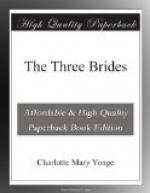“What things?”
“Speaking in that improper way about a gown.”
“She seems to have said what was the fact.”
“It can’t be! It is preposterous! I never heard it before.”
“Nor I; but Bindon evidently is up in those matters.”
“It was only to support Rosamond; and I am quite sure she said it out of mere opposition to me. You ought to speak to Julius.”
“About what?” said Raymond.
“Her laughing whenever I mention Dunstone, and tell them the proper way of doing things.”
“There may be different opinions about the proper way of doing things.” Then as she opened her eyes in wonder and rebuke, he continued, in his elder-brotherly tone of kindness, “You know I told you already that you had better not interfere in matters concerning his church and parish.”
“We always managed things at Dunstone.”
Hang Dunstone! was with some difficulty suppressed; but in an extra gentle voice Raymond said, “Your father did what he thought his duty, but I do not think it mine, nor yours, to direct Julius in clerical matters. It can only lead to disputes, and I will not have them.”
“It is Rosamond. I’m sure I don’t dispute.”
“Listen, Cecil!” he said. “I can see that your position may be trying, in these close quarters with a younger brother’s wife with more age and rank than yourself.”
“That is nothing. An Irish earl, and a Charnock of Dunstone!”
“Dunstone will be more respected if you keep it in the background,” he said, holding in stronger words with great difficulty. “Once for all, you have your own place and duties, and Rosamond has hers. If you meddle in them, nothing but annoyance can come of it; and remember, I cannot be appealed to in questions between you and her. Julius and I have gone on these nine-and-twenty years without a cloud between us, and I’m sure you would not wish to bring one now.”
Wherewith he left her bewildered. She did not perceive that he was too impartial for a lover, but she had a general sense that she had come into a rebellious world, where Dunstone and Dunstone’s daughter were of no account, and her most cherished notions disputed. What was the lady of the manor to do but to superintend the church, parsonage, and parish generally? Not her duty? She had never heard of such a thing, nor did she credit it. Papa would come home, make these degenerate Charnocks hear reason, and set all to rights.
Young Mrs. Charnock Poynsett had plenty of elasticity, and her rebuffs were less present to her mind in the morning than to that of her husband, who had been really concerned to have to inflict an expostulation; and he was doubly kind, almost deferential, giving the admiration and attention he felt incumbent on him to the tasteful arrangements of her wedding presents in her own sitting-room.




